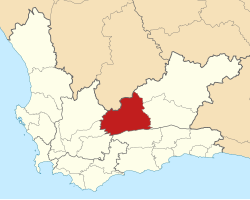Laingsburg Local Municipality
Laingsburg | |
|---|---|
 Location of Laingsburg Local Municipality within the Western Cape | |
| Coordinates: 33°15′S 21°00′E / 33.250°S 21.000°E | |
| Country | South Africa |
| Province | Western Cape |
| District | Central Karoo |
| Seat | Laingsburg |
| Wards | 4 |
| Government | |
| • Type | Municipal council |
| • Mayor | Mitchell Smith (Patriotic Alliance) |
| Area | |
| • Total | 8,784 km2 (3,392 sq mi) |
| Population (2022)[2] | |
| • Total | 11,366 |
| • Density | 1.3/km2 (3.4/sq mi) |
| Racial makeup (2011) | |
| • Black African | 3.5% |
| • Coloured | 87.5% |
| • Indian/Asian | 0.5% |
| • White | 7.6% |
| First languages (2011) | |
| • Afrikaans | 94.3% |
| • English | 1.7% |
| • Xhosa | 1.2% |
| • Other | 2.8% |
| Time zone | UTC+2 (SAST) |
| Municipal code | WC051 |
Laingsburg Municipality (Afrikaans: Laingsburg Munisipaliteit) is a local municipality located in the Western Cape province of South Africa. As of 2022, the population is 11,366.[3] Its municipality code is WC051.
Geography
[edit]The municipality covers an area of 8,784 square kilometres (3,392 sq mi) on the south-western edge of the Great Karoo. The southern edge of the municipality lies along the Anysberg and Swartberg mountains, while its northern edge is the provincial border with the Northern Cape. It abuts on the Beaufort West and Prince Albert Municipalities to the east, the Kannaland Municipality to the south, the Langeberg, Breede Valley and Witzenberg Municipalities to the west, and the Karoo Hoogland Municipality to the north.
The principal settlement in the municipality is the town of Laingsburg, which as of 2011 has a population of 5,667. West of Laingsburg is the village of Matjiesfontein, population 422.
History
[edit]At the end of the apartheid era, the area that is today the Laingsburg Local Municipality formed part of the Central Karoo Regional Services Council (RSC). The town of Laingsburg was governed by a municipal council elected by the white residents while the coloured residents were governed by a management committee subordinate to the white council.
After the national elections of 1994 a process of local government transformation began, in which negotiations were held between the existing local authorities, political parties, and local community organisations. As a result of these negotiations the municipality and the management committee were dissolved, and the Laingsburg Transitional Local Council (TLC) was established to replace them in December 1994.
The TLC was initially made up of members nominated by the various parties to the negotiations, until May 1996 when elections were held. At the time of these elections the Central Karoo District Council was established in place of the Central Karoo RSC, and transitional representative councils (TRCs) were elected to represent rural areas outside the TLCs on the District Council. The area that was to become Laingsburg Local Municipality was covered by the Laingsburg TRC.
At the local elections of December 2000 the TLC and TRC were both dissolved and the Laingsburg Local Municipality was established as a single local authority. At the same election the Central Karoo District Council was dissolved and replaced by the Central Karoo District Municipality.
Politics
[edit]| This article is part of a series on the |
| Politics of the Western Cape |
|---|
The municipal council consists of seven members elected by mixed-member proportional representation. Four councillors are elected by first-past-the-post voting in four wards, while the remaining three are chosen from party lists so that the total number of party representatives is proportional to the number of votes received. In the election of 1 November 2021 no party obtained a majority of seats on the council. The African National Congress (ANC) subsequently formed a coalition with the Karoo Democratic Force (KDF) and the Patriotic Alliance to govern the municipality with the PA's Mitchell John Smith voted in as mayor.[4]
The following table shows the results of the 2021 election.[5]
| Laingsburg local election, 1 November 2021 | ||||||||
|---|---|---|---|---|---|---|---|---|
| Party | Votes | Seats | ||||||
| Ward | List | Total | % | Ward | List | Total | ||
| African National Congress | 861 | 833 | 1,694 | 26.3% | 1 | 1 | 2 | |
| Karoo Democratic Force | 749 | 827 | 1,576 | 24.4% | 0 | 1 | 1 | |
| Democratic Alliance | 781 | 749 | 1,530 | 23.7% | 3 | 0 | 3 | |
| Patriotic Alliance | 433 | 462 | 895 | 13.9% | 0 | 1 | 1 | |
| 4 other parties | 381 | 377 | 758 | 11.7% | 0 | 0 | 0 | |
| Total | 3,205 | 3,248 | 6,453 | 4 | 3 | 7 | ||
| Valid votes | 3,205 | 3,248 | 6,453 | 99.1% | ||||
| Spoilt votes | 26 | 35 | 61 | 0.9% | ||||
| Total votes cast | 3,231 | 3,283 | 6,514 | |||||
| Voter turnout | 3,286 | |||||||
| Registered voters | 4,770 | |||||||
| Turnout percentage | 68.9% | |||||||
References
[edit]- ^ "Contact list: Executive Mayors". Government Communication & Information System. Archived from the original on 14 July 2010. Retrieved 22 February 2012.
- ^ a b "Laingsburg (Local Municipality, South Africa)". Population Statistics, Charts, Map and Location. 2 February 2022. Retrieved 9 August 2024.
- ^ a b "Statistics by place". Statistics South Africa. Retrieved 27 September 2015.
- ^ "Patriotic Alliance claims first ever mayoral victory in Laingsburg Municipality". iol.co.za. Retrieved 16 November 2021.
- ^ "Election Result Table for LGE2021 – Laingsburg". wikitable.frith.dev. Retrieved 8 November 2021.



